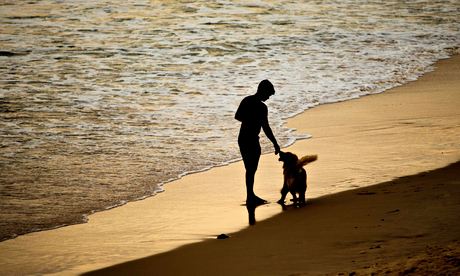
Daniel Galera is a Brazilian publisher and writer. In his acknowledgments he thanks a friend for being his companion in open-water swimming. Swimming and water play a large part in this novel, and in the life of the main character, who has left his home town of Porto Alegre to live by the sea at Garopaba. He is a triathlon competitor, swimming coach and licensed PE trainer.
Ostensibly, he simply wants to get away to live on a beach, or as the maladroit translation has it, "in front of a beach". The main character is unnamed, which leads to some minor irritation, as the reader has to pause to work out who is speaking to whom at any one time. Also, it seems rather pointless to withhold his name, as his brother, his father and many others are named. However, there is a determinedly postmodernist undertow to this novel, and the unnamed character is intriguing; his move to Garopaba is clearly going to yield many secrets, some regarding his grandfather, an outcast who once lived in this town and was possibly murdered by suspicious suspicious-looking locals. He also falls in with a woman called Dália, but tires of her.
The protagonist (we will call him Nameless) suffers from a rare neurological condition, prosopagnosia (also known as face blindness), which – I discovered – Oliver Sacks has written about. The small number of people in the world who suffer from this condition cannot recognise faces; they cannot even recognise their own face in a photograph or a mirror. The condition can be congenital or it can develop with age. The connections between recognition and love, misunderstanding and intimacy are part of the intrigue which swathes the novel.
Sadly, its riches are diminished by the translation. There are many instances of jarring American colloquialism ("preppiest", and "any time soon") and countless infelicities.
Nameless visits his father, who announces that he is going to kill himself. The father has with him his elderly dog, Beta, and Nameless offers to look after Beta if his father is proposing to die soon. Beta then moves with Nameless to Garopaba, and they become very close. So her presence in the novel grows – Beta's needs, and Nameless's musings about Beta, form a substantial part of the novel.
There are intimations that Nameless has been jilted by the love of his life, who moved in with Dante, his brother, and this may be the reason he has gone to live far away on a beach. He rents an apartment, its toes virtually in the sea, and gets a job teaching swimming, running and supervising triathlon training; he is very popular with his clients, although he has difficulty remembering their faces. He makes friends with some of the locals, and makes enquiries about his grandfather, Guadério, who, it seems, was feared for his readiness to use a knife. Rumours have it that he was stabbed in the dark by a group of men. Others say he reappears as a ghost.
The novel is full of detail, though this often consists of no more than lists of what Nameless has seen of the weather, or the state of the sea, or what he is eating: "He is starting to feel hungry so he goes into a diner and orders two meat pasties and a Coke. The girl at the cash register turns her head to the back of the establishment, looking for someone who isn't there, then looks at him." And: "He goes outside and gets his vulcanized rubber flippers, swimming goggles, a packet of cream-filled biscuits and the harpoon that Bonobo gave him. He rubs sunscreen on his face and pulls on his Speedos and an old long-sleeved T-shirt. He locks the windows of the apartment, picks his way over the rocks and wades out to the boat." There is something obsessive about the profligacy of these minor details, although they serve to ramp up the tension of what turns out to be a quest.
This is an interesting and original book, and the final chapter is particularly moving. Shame about the translation.
Justin Cartwright's novel Lion Heart will be published in paperback by Bloomsbury on 3 July.

